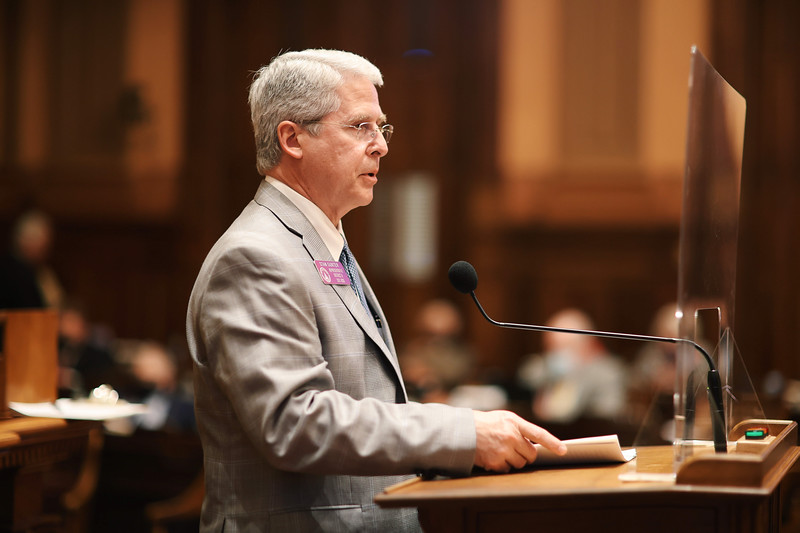On Monday, April 4, the 2022 legislative session came to an end as the House and Senate completed the 40th and final day of session, also known as “Sine Die,” which is a Latin term meaning “without assigning a day for further meeting.” As we convened for Sine Die, we worked tirelessly past midnight to ensure that important legislation for our state had every opportunity to be considered this year. The House gave final passage to many quality pieces of legislation, including a new state budget, which will now go to Governor Brian Kemp for his final consideration.
The House fulfilled its only constitutional obligation late in the night on Sine Die when we voted to adopt a conference committee report for House Bill 911, the Fiscal Year 2023 (FY 2023) budget. Upon the governor’s signature, the FY 2023 budget will go into effect July 1, 2022, and is set at a record-breaking revenue estimate of $30.2 billion, which is an increase of $2.9 billion or 10.8 percent over the budget we passed last session. Due to positive economic projections, HB 911 would permanently restore nearly $669 million that was originally eliminated from the budget following the initial fallout from the pandemic in 2020. The House and Senate were able to finalize a budget that would make historic investments in our state agencies, and I want to bring your attention to just a few significant investments included in this budget.
HB 911 includes $758 million for the state’s workforce to help reduce the high turnover rate of state employees, which impacts critical government services. Specifically, this budget would provide a well-earned $5,000 cost-of-living adjustment (COLA) for eligible state employees, allow state employees to withdraw and be compensated for up to 40 hours of accrued leave annually, increase the employer 401(k) match up to nine percent and prefund a COLA for state retirees. These strategic compensation initiatives aim to target the state’s all-time high average turnover rate of 23 percent, which is even higher for some agencies at 40 percent. We also included $62.4 million for additional targeted salary adjustments to prevent workers from leaving for higher paying jobs in other government agencies or the private sector after they’ve been trained.
Using $148.9 million in new funds, this FY 2023 budget would also bolster funding for mental health coordinated care and law enforcement systems in every region of the state. Law enforcement agencies would be able to hire additional law enforcement positions and make salary adjustments to further tackle crime and keep citizens safe in our state. Our health and judicial state agencies would also receive ample funding to support and expand services for Georgians who are facing a mental health crisis or addiction, including expanding accountability courts, suicide prevention support, crisis bed availability and a workforce to deliver those services. This funding would work in conjunction with provisions in the House’s Mental Health Parity Act (House Bill 1013), which I discuss in more detail below.
Funding for K-12 education dominates nearly 40 percent of the FY 2023 budget, totaling $11.8 billion to fully fund Georgia’s public schools. The FY 2023 budget also includes $291.7 million to provide a $2,000 pay increase for certified teachers and employees, allowing us to complete our original goal to increase teacher pay by $5,000. The teacher’s retirement system would also greatly benefit from additional funding in this upcoming state budget.
To promote a healthy Georgia, this budget includes $5 million in Low-Income Medicaid funds, allowing the state to submit federal waivers to provide Medicaid benefits to individuals with HIV and to remove the five-year waiting period for lawful permanent residents to qualify for benefits. We also appropriated $1.8 million for more lead inspectors and testing machines based on legislation that was recommended by the House Study Committee on Childhood Lead Exposure. The Sick Cell Foundation would also receive $538,738 for care and testing in rural areas, and $1.7 million would go towards our local health departments with infrastructure grants.
HB 911 would also allow for the elimination of special institution fees at our state colleges and universities, fund workforce programs for high-demand careers, as well as implement a 10 percent provider rate increase for foster parents, relative caregivers, child caring institutions and child placing agencies.
House Bill 1437, or the Georgia Tax Reduction and Reform Act of 2022, also received final passage on Sine Die through the adoption of a conference committee report. HB 1437 would provide a historic income tax cut to save Georgians an estimated $1 billion annually once the cut goes into effect in 2024. This final version of HB 1437 would eliminate personal income tax brackets and replace them with a single, flat rate of 5.49 percent, and this tax rate would gradually decrease each year until it reaches 4.99 percent under specific circumstances. HB 1437 would also eliminate the current standard deductions for taxpayers and, instead, would increase the personal exemptions to $12,000 for single and head of household taxpayers and to $18,500 for married taxpayers who file a joint return. The personal exemption for married taxpayers filing a joint return would gradually increase to $20,000 for 2024, $22,000 for 2028 and $24,000 for 2030. The bill would also increase the amount of earned income allowed to be included in the retirement income exemption to $5,000 and would create a $10,000 cap for the amount of state and local taxes allowed to be deducted. Following strong economic stewardship throughout the pandemic, I am proud that we can continue providing efficient, effective government services, while also working to give taxpayers back their hard-earned dollars. Implementing this tax cut would allow our state to remain a great place for families to live, work and play for many years to come, and I am hopeful that Gov. Kemp will sign this bill into law.
The House also unanimously gave final passage to House Bill 1188 to help keep dangerous predators behind bars, as well as keep these offenders away from Georgia children when they are released from jail. HB 1188 would clarify in Georgia law that each act of child molestation and the sexual exploitation of a child should be charged as separate crimes. The state has prosecuted these offenses separately in the past, but a Georgia Supreme Court ruling a few years ago directed these offenses to be grouped into one charge, which left victims without the justice they deserve. This legislation would address this court ruling and make it clear in the law that these offenders should be charged separately for each of their heinous crimes.
Now that this year’s legislative session has come to an end, Governor Brian Kemp will review the legislation that received final passage by the House and Senate, and these measures will become state laws upon his signature. If the governor does not sign or veto a measure within 40 days of Sine Die, it automatically becomes law.
You are always welcome to contact me with any questions or concerns about topics or issues that are important to you and your family. You can reach me at my capitol office at 404-656-0325 or Stan.Gunter@house.ga.gov. Also, because the House has adjourned for the year, I will be spending much more time in our district. Feel free to contact me locally at 706-897-5609.
As always, thank you for allowing me to serve as your representative.

